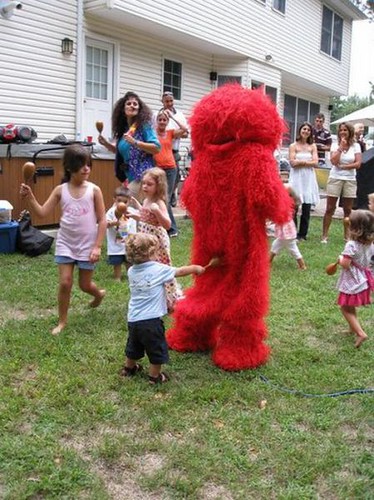As mentioned in the previous post, Final fantasy 1, the fantasy stage of child development and the development of the P1 ego state are closely linked.

Reference
Pam Levin, 1974. Becoming the way we are. Berkeley: Transactional publications
She states that when people develop problems about this stage they can often have a scary, sinister and demonic quality about them. Children can report nightmares and can have a particular interest in magic.
Levin refers to this stage of development as the Supernatural Child lasting from 3 to 6 years of age. The stage of fantasy and magic and scary things. Witches, potions, spells, dragons, flying broomsticks are all part of this magical, devilish, scary and a bit of fun part of the personality which TA theory would say is the P1 part of the personality. We all know magicians fake it but there is still that part of us that likes to see some magic in action.
This part of the personality is engaged with things like the Harry Potter stories. It can also be found in Batman with characters like the Penguin, the Riddler and the Joker. They are presented as mischievous, irreverent and yet appealing characters.

---------------
Two other pieces of research state:
Bouldin, P.
An investigation of the fantasy predisposition and fantasy style of children with imaginary companions. The Journal of Genetic Psychology, 2006, 167(1), 17 - 29.
According to Piaget (1962) (Play, dreams, and imitation in childhood. New York: Norton.) fantasy play, daydreaming and dreaming all evolve from the same mental process.
Children who engage in extensive fantasy play tend to be more imaginative. Thus they have an imaginative predisposition.
Children with imaginary friends were more predisposed to engage in fantasy than those children who did not have such friends. (Mean age of children in study was 6 years old)
Children with imaginary friends:
1. Reported they daydreamed more often
2. Daydreamed when alone
3. Felt they could almost see and hear the contents of their daydreams in front of them.
These children are able to create vivid mental images and tend to use these in times of solitude. And more likely to play solitary games with a mythical theme. They are seen as having enriched fantasy lives and are seen as highly imaginative.

Heuvelman, L.R. & Graybill, D.
Assessment of children’s fantasies with the Make A Picture Story: Validity and norms. Journal of Personality Assessment, 1990, 55, 578 - 592.
The younger the child the more fanciful the fantasy
Behaviourally aggressive children tended to have more aggressive fantasies but it is also noted that normal children also make frequent use of violence and aggression in their fantasies. Thus caution must be taken when children display violent fantasises to assume this is a sign of potential aggressive behaviour problems.
Children rarely will have nude figures in their fantasies.
Children will generally have child figures in their fantasies and usually select those of the same sex as the child.
---------------------

The schizoid personality
The DSM notes of the schizoid personality, “Excessive daydreaming is often present”. Based on the research above one can begin to identify those children who have the potential to develop the schizoid personality. For instance those children with fantasy involving imaginary friends.
Once identified one can then adjust their parenting style to make sure the schizoid personality development remains within the normal range. Some key features of the schizoid structure are as such:
Core decision
The world is scary so withdraw from it (people) and don’t show any of your feelings
Other injunctions
Don’t show your feelings
Don’t be close
Don’t belong
Don’t get your needs met
Ego states
Commonly high in Conforming Child ego state as ‘rocking the boat’ will attract attention and make people focus on them which is scary. The “withdrawn Child ego state” best describes them. They have little desire for social interaction. Often good thinkers and so they can be high in Adult ego state. The quiet achiever is a common style for them and thus they make good employees. Low Free Child ego state as that involves the expression of feelings and can also attract attention. They can give the appearance of being cold or aloof.
They in particular find it difficult to express anger (and assertion which is a derivative of anger). So Rebellious Child ego state is not often used. This can make them appear indecisive and not clear in their goals. Often present is a lack of social skills.

The demon or lillith.
Other than schizoid personality problems, the P1 stage of development (3 - 6 years of age) can result in the formation of the demon or lillth part of the personality
Consider this quote from Eric Berne who wrote about the demon in his book, ‘What do you say after you say hello’.
He stated, “The demon is the jester in human existence and the joker in psychotherapy.... No matter how well the therapist plans his psychotherapy, the patient always has the upper hand. At the point when the therapist thinks he has the four aces, Jeder plays his joker, and the demon wins the pot. Then he skips merrily off, leaving the doctor to leaf through the deck trying to figure out what happened. Even if he is ready for it, there may be little he can do..... The demon first appears in the high chair, when Jeder scatters his food on the floor with a merry glint, waiting to see what his parents will do. If they make friends with it, it will go onto later mischief, and then perhaps into humorous fun and jokes. If they beat it down, it will lurk surly in the background, ready to leap out at an unguarded moment and scramble his life as it originally scrambled his food.” (Pp 122 - 123).
Berne, E. 1972. What Do You Say After You Say Hello? Bantam: New York.
A fixation at the P1 stage of development can result in this type of behaviour becoming prominent in the personality.

Graffiti
I'm sorry Tony, but all I have for this post is..."Wow"!
ReplyDeleteGlad you like it Roses, Has been quite a series these Final fantasy episodes!
ReplyDeleteGraffiti
A great series indeed
ReplyDeleteThanks Kahless,
ReplyDeleteGald you liked them
Tony